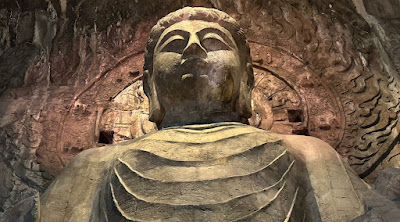Gods in Power Games
 |
| Wu Zetian as imagined by Copilot Designer |
"All happy families are alike; each unhappy
family is unhappy in its own way," Leo Tolstoy told us. It has come to be
known as the Anna Karenina Principle. Is there a similar principle in politics?
Something like: “All happy dictators are alike”?
This doubt struck me as I was reading
the fifth chapter of William Dalrymple’s latest book, The Golden Road.
Titled ‘The Fifth Concubine’, this chapter is about Empress Wu Zetian of 7th
century China. Dalrymple informs us that she was “the only woman who became
emperor in her own right in 3,000 years of Chinese history.”
She came from rather humble origins.
Daughter of a merchant, Wu was admitted to Emperor Taizong’s harem as a
concubine of the fifth grade. That was a lowly position, not much more than
that of maid. But Wu was so beautiful that the aging Emperor was besotted and gave
her the title of ‘Enchanting Miss Wu’.
After the old Emperor’s death, his
son, the new Emperor, made Wu his Empress. It didn’t happen all of a sudden, of
course. You don’t rise in politics so quickly, especially if you come from a
lowly background. Wu knew how to climb the ladder with poisoned steps, creeping
like a smooth snake at times and hitting like a killer when required. She
eliminated the original Empress from her way. She kept her own sons too far
enough from the throne. When her husband had a stroke, Wu ascended the throne
in spite of the staunch male chauvinism that guided the Confucian political
structures.
Wu replaced Confucianism with
Buddhism. As simple as that. One of the best uses of religions has always been
in the power games of politics. Gods have never been of as much use to ordinary
citizens as they are to aspiring dictators. Wu brought Buddhist monks and
scholars together, even from India, and got them to write scriptures and
history and codes of behaviour as she wanted them. She constructed monasteries,
erected immense statues of the Buddha, and towards the end claimed that she was
a divine incarnation. She bestowed upon herself the title of ‘Heavenly Empress’.
The 55-foot statue of Buddha that she got constructed continues to dominate the
Longmen Grottoes even today. Dalrymple says that the Buddha in this statue was
modelled after Wu herself.
 |
| Wu Zetian's Buddha |
She decimated dissenters and critics
mercilessly. She could do all that in a country that was notorious for its male
chauvinism, because she had God on her side. The pinnacle of her triumph, according
to Dalrymple, is the construction of the Heavenly City of the Bodhisattva
Maitreya in Luoyang. Wu claimed that she was an incarnation of Maitreya and she
got many giant statues of Maitreya carved all over China.
Wu might have considered herself the
greatest human being in the world, more divine than human. But she committed a
lot of sins all along her way upward. Towards the end of her life, she became
aware of all those sins. She repented. In the end of half a century of inhuman
reign in the name of gods. At the age of 75, she got someone to inscribe a
prayer for forgiveness on a gold tablet that was 14 inches long. This tablet
was discovered by a peasant in 1982 in a crevice on Mount Song. In that prayer,
Wu begs gods to remove her name from “the register of punishable sinners”.
We will never know whether the gods
were kind to her after her death. The men who succeeded her were certainly not.
They did whatever they could to erase her memory from history. Dalrymple says
that they “compiled long accounts of her sins and murderous misdemeanours” and
turned her into “a one-dimensional cartoon villain, as sadistic as she was
lascivious.”
History wreaked vengeance on evil
sooner than one would imagine, even in those ancient days. Today, with all the
digital and other evidence available all over the place against our leaders, I
wonder how history will deal with them once they are out of power, even if the
temples and statues they built for gods may survive to the end of the world. 
Maitreya in Heavenly City
Hari Om
ReplyDeleteWell considered! YAM xx
Thank you
Delete" History is always the story of the Victors, and never of the Vanished. " Walter Benjamin
ReplyDeleteWu was victorious for half a century, but her own turned against her in her last days. Of course, she had persecuted him too. Otherwise history would have been different.
DeleteIt's always about gaining power. I bet she didn't do anything worse than any of the male emperors, but because female, all of those things were made to be way worse than they were.
ReplyDeleteTrue, China was a totally patriarchal country where women weren't expected even to speak in public.
DeleteVery interesting account.
ReplyDeleteKeep returning for more interesting accounts 😊
Delete